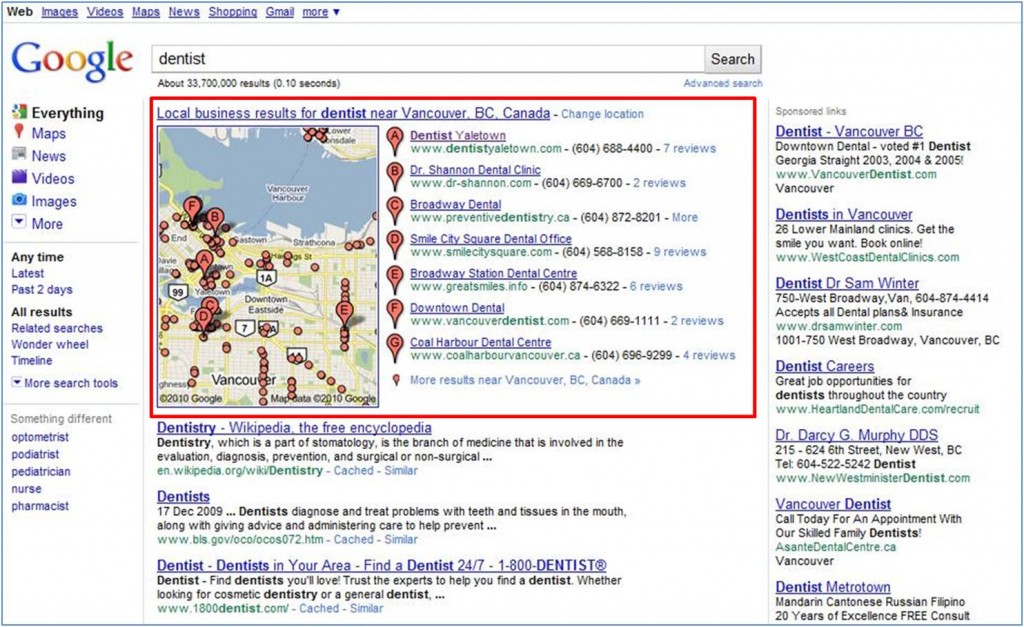Back in 2008, Google – followed by the other major search engines – began to incorporate local business search results (which formerly appeared only as part of Google Maps) into its “traditional” search results page when people submitted queries that had a local “flavor” to them (e.g., “Vancouver dentist”).
Today, even if a “geographic modifier” (e.g., city name) is not part of the search query, Google may display local business search results or prompt searchers to indicate whether or not they were looking for local results when it detects local intent.

Local business search results appear as three, seven or ten business listings (commonly known in the search marketing industry as the “local 3-pack,” “local 7-pack,” and “local 10-pack”) alongside a map that displays the location of the businesses. Local business search results only ever appear on page one of search results and commonly appear at the very top of the page – just below the sponsored listings and, importantly, above the organic search results (occasionally they also appear somewhere around the middle of page one).

This means that it’s possible for you to achieve something that may be beyond the reach of your website: capturing a top position on the first page of Google, where 90% of all clicks happen.
As a matter of fact, you don’t even need a website because Google “composes” Places Pages from data it mines from sources of local business information that are scattered all over the Web. In fact, if you’ve got an Internet Yellow Pages listing, you’re probably going to find that Google has already composed a Places Page for your business.
Slow Uptake Means Low Levels of Competition – For Now
And right now – due to a slow uptake by business owners (Google reports that its local search index contains more than 50 million pages worldwide, yet only 4 million have been claimed) – the level of competition in Google’s local search results is very low for most for most keywords compared to Google’s universal search results.
For example, following are the levels of competition for the search term “Vancouver real estate agent” in both Google’s universal search results and in Google’s local business search results:
- 40.3 million results in universal search results – meaning that a webpage that targets the term “Vancouver real estate agent” would have to be better (read: more relevant) than more than 40 million other pages to secure the number one position on Google
- 6,902 results in local business search results – meaning that your Google Places Page would have to be better than only 6,902 other Google Places Pages to secure a position at the top of local business search results on page one of Google
On top of low levels of competition (at present, anyway) it’s also important to know that the demand for local search results is substantial: according to Google Places Stats and Facts one in five of all Google searches has a local intent behind it.
Local Search Has Gone Mobile
Local search is even more significant when it comes to mobile devices, as Google recently announced that one-third of all Google searches via the mobile web have a local flavor to them.
And since web access via mobile phones continues to rise sharply – and is expected to overtake desktop access by 2013 – the importance of claiming and optimizing your business’ Google Places Page cannot be overstated because it is the only way your business can be found in local mobile organic search results (sponsored/paid results are different).
Your website is irrelevant to local mobile organic search results. This means that – on a local level – a “mom-and-pop” business that doesn’t even have a website can outrank a major multinational corporation with a high-authority, aged domain.
Local SEO is Different than Universal SEO
The problem is that most businesses – and even many SEO consultants – do not understand how Google ranks local search results. By and large, they do not even know that Google’s ranking algorithm for local search results is completely different from its ranking algorithm for universal search results.
And it has to be – because it is not ranking the pages of a website (remember: you don’t even need a website), it’s ranking a business’ Google’s Places Page. And the ranking factors for a Google Places Page are completely different than the ranking factors for a regular website.
The time to strike is now. Contact me to help you claim and optimize your Google Places Page and watch as your business becomes a dominant force online in your local market.